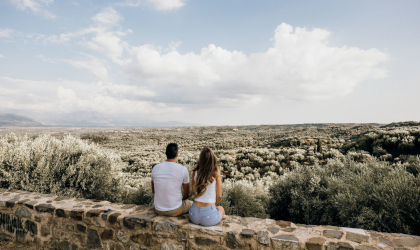“Authentic and local experiences are now the major trends in the travel industry,” reports Greek tourism consultant Dimitris Palaiogiannis. In Greece, he adds, agrotourism and food tourism offerings in various parts of the country combine “the quality products of the land with a unique cultural heritage” to reward explorers with unforgettable experiences.
In the Peloponnese peninsula in southern Greece, for example, we find several agrotourism and culinary tourism establishments that focus on products that have played an essential role in Greek cuisine, history, religion, and the economy for millennia: olives and olive oil. The peninsula’s southwestern section, Messinia, is one of the country’s major olive and olive oil producing regions. Its most famous town, Kalamata, is well-known for the purple-black table olives named after it.
West of Kalamata, near the Ionian Sea, we find the Messinian Story Olive Tour. As Stefanie Bousdouka told Greek Liquid Gold, this family business is “based on love and passion for the olive and extra virgin olive oil. We want to share our 30 years of knowledge about this key ingredient of the Mediterranean diet with people seeking contact with nature. Our goal is to show our visitors a different side of Greece: the life of the locals, the culture, history, and gastronomy.”
Bousdouka believes “there is a great demand from tourists for agricultural and traditional activities.” Welcomed with warm hospitality under olive trees in the village of Korifasio, guests learn about olive cultivation, the olive harvest, and the history and production of Greek olive oil. During a tasting session, they find out how to recognize extra virgin olive oil. Visitors can also participate in such activities as breadmaking, cooking and baking traditional sweets and local specialties, and (in October and November) the olive harvest.
In Androusa, a village located 20 kilometers from Kalamata, The Olive Routes offers “a complete experience to introduce our guests to the tradition, history, and gastronomy of the area. Having the olive tree as our focus, we created local, authentic entertaining and educational experiences that include walks in the olive grove, visits to traditional and modern olive mills, an olive treasure hunt game, and an olive oil tasting workshop featuring different olive oil varieties and food pairing,” as Dimitra Mathiopoulou explains.

Mathiopoulou is an olive oil producer, tour guide, and member of the certified olive oil tasting panel of the University of Peloponnese, while her husband Stathis Kontopoulos is the fifth generation owner of an olive oil mill. They both love to meet new people, “to share our love for our land and our olive tradition” and help visitors connect with the land and its history. In one tour option, they introduce tourists to the 13th century castle of Androusa, its legendary olive trees, and its wonderful view of a valley full of olive groves.
Based in Kalamata, Mama’s Flavours offers several different “unique, authentic, and exciting” gastronomy experiences, as its founder says, both in town and in other parts of the Peloponnese. Maria Monastirioti was inspired in 2014 by a TV presentation of a Greek woman preparing traditional products in a women’s cooperative. She thought, “Wouldn’t it be great for these traditional products to also be known abroad, and not only in Greece? And along with them, Greek gastronomy?” So she set out to find ways to introduce them to visitors who might later act as ambassadors for Greek cuisine.
In a video on her website, Monastirioti quotes Walt Disney: “If you can dream it, you can do it.” And she did, organizing cooking classes, wine and olive oil tastings, pasta making, and olive harvesting experiences led by Greek women. There are opportunities for cooking classes and tastings combined with a farm tour and organic vegetable picking, a walk through olive groves or vineyards, or an exploration of a winery, castle, or village. In each case, local products, recipes, and traditions are showcased and enjoyed, highlighting mothers’ flavors and ways of doing things across the generations.
These businesses all offer their programs in both English and Greek; some can arrange for other languages, too. This year, they tend to have more Greek visitors than usual, and not as many from other countries. Reporting that they carefully follow all government guidelines, these hosts and organizers focus on participants’ safety and health as well as their enjoyment.
For example, Dimitra Mathiopoulou of The Olive Routes is determined to provide “an authentic and full experience, while focusing on every aspect of hygiene for our guests and employees. Closely following the guidelines of the Greek government, we have taken precautionary measures, reinforcing our already stringent practices in group management, food hygiene standards, equipment disinfection, and cleaning.” Many of their activities take place outdoors. Groups are smaller than usual, and social distancing is observed. There are more options for cancellation and rescheduling, and booking and payment can be done online.
Both travelers and those who are staying home this year can start by exploring Greek agrotourism and culinary tourism choices on such online platforms as the olive oil info site Greek Liquid Gold, which has an agrotourism and food tourism section, and Zorbabook. Zorbabook founder Dimitris Palaiogiannis explains that his project “aims to strategically communicate Greek culinary heritage worldwide, contribute to the sustainable development of culinary tourism, and develop a global ecosystem of like-minded people and companies.” He hopes to inspire current and future visitors “to engage with unique culinary experiences;” he also aims to “help culinary brands recognize and adopt a tourism development model,” then showcase what they offer.
If Greece succeeds in developing the potential synergy between its agricultural sector and tourism at a national level, Palaiogiannis suggests, this will have various economic and cultural benefits for the country. For example, it could help overcome the excessively seasonal nature of Greek tourism, preserve local traditions, create alternative sources of income, and increase entrepreneurial opportunities for rural communities. As we have seen, a number of dedicated hosts already introduce visitors to the Greek culinary and agricultural heritage throughout the year in what appears to be a growing trend.
Thanks to Dimitra Mathiopoulou for the photos of The Olive Routes activities. For help making a new connection with Zorbabook partner Mama’s Flavours, Greek Liquid Gold thanks Dimitris Palaiogiannis, the founder of zorbabook.com, Business Development Director of Low Season Traveler, and Board Advisor of The World Tourism Association for Heritage & Culture (WTACH).
Even for those who cannot travel this year, Greece has an enormous amount to offer in terms of virtual visits via photos, music, videos, food, and drink. For example, you can enjoy the flavors of Greece from almost anywhere, thanks to the many brick and mortar and online shops carrying such healthy foods as Greek extra virgin olive oil. Find out Where to Buy Greek Extra Virgin Olive Oil Outside Greece.
All businesses, organizations, and competitions involved with Greek olive oil, the Mediterranean diet, or agrotourism or food tourism in Greece, as well as anyone else interested in supporting Greeks working in these sectors, are now invited to consider the advertising and sponsorship opportunities on the Greek Liquid Gold: Authentic Extra Virgin Olive Oil website. The only wide-ranging English-language site featuring news and information from the Greek olive oil world, it has reached readers in more than 200 countries around the globe.


